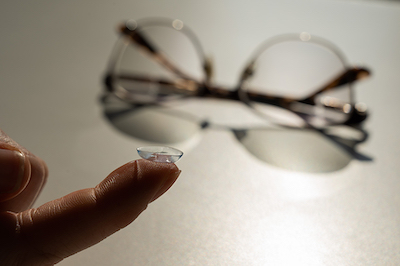Vision problems are more common today than ever before. With an increasing number of people requiring vision correction, the demand for suitable solutions has grown exponentially. The two most popular and widely used vision correction options are eyeglasses and contact lenses. Both have their advantages and disadvantages, and choosing between them can be a daunting task. In this article, we will discuss the pros and cons of glasses and contacts, helping you make an informed decision based on your lifestyle and preferences.
Eyeglasses: The Classic Choice
Pros
- Comfort: One of the primary advantages of wearing glasses is the comfort they provide. There is no direct contact with the eyes, reducing the risk of irritation and discomfort. Many people find glasses to be a more comfortable solution, especially if they have sensitive eyes.
- Low maintenance: Glasses are relatively low maintenance compared to contact lenses. They do not require daily cleaning and can be easily wiped clean with a microfiber cloth. Moreover, they don’t need to be replaced as frequently as contact lenses.
- Style statement: Glasses can be a fashionable accessory, allowing you to express your personality and enhance your appearance. There are countless styles, colours, and shapes to choose from, making it easy to find a pair that complements your face shape and personal style.
- Protection: Glasses can also offer some degree of protection from environmental factors such as dust, wind, and harmful UV rays if equipped with the appropriate lenses. They can even help shield your eyes from potential injuries during sports or other physical activities.
- Versatility: Glasses can be easily customized to cater to your specific needs. For instance, you can opt for bifocal or progressive lenses to address both nearsightedness and farsightedness. Transition lenses that automatically darken in sunlight are another popular option for those who want added convenience.
Cons
- Appearance: Some people may feel self-conscious wearing glasses, especially if they are not comfortable with the way they look in them. Glasses can also cause reflections and glare, which may be distracting for some individuals.
- Peripheral vision: Glasses may not provide optimal peripheral vision due to the limited area covered by the lenses. This can be particularly problematic for people who play sports or engage in activities that require a wide field of view.
- Discomfort: Although glasses are generally comfortable, they can become uncomfortable if they are not well-fitted or if they slip down the nose. Additionally, wearing glasses for extended periods may cause pressure on the nose and ears, leading to discomfort.
- Weather limitations: Glasses can fog up in cold or humid weather, making it difficult to see clearly. They can also become wet in the rain, which can be inconvenient and annoying.
Contact Lenses: A Modern Alternative
Pros
- Unobstructed vision: Contact lenses offer a wider field of view than glasses since they sit directly on the eye. This allows for improved peripheral vision and a more natural visual experience.
- Aesthetics: Many people prefer the appearance of contact lenses because they are virtually invisible. This can be especially appealing for those who feel self-conscious wearing glasses or who simply prefer the look without them.
- Compatibility with activities: Contact lenses are ideal for sports and physical activities, as they do not move around, fall off, or fog up. They also do not interfere with protective gear like helmets or goggles.
- Adaptability: Contact lenses are available in various types, including soft, rigid gas-permeable, and hybrid lenses, which cater to different needs and preferences. They can also be customized to address specific vision issues, such as astigmatism or presbyopia.
- Cosmetic options: Coloured contact lenses can enhance or change your natural eye colour, allowing for a fun and unique way to express yourself. These lenses are available both with and without prescription, providing options for those who want to experiment with their appearance without compromising their vision.
Cons
- Maintenance: Contact lenses require a more extensive maintenance routine than glasses. They must be cleaned and disinfected daily to avoid infections and other eye-related complications. This can be time-consuming and may not be suitable for everyone.
- Increased risk of infection: Wearing contact lenses increases the risk of eye infections, especially if proper hygiene and care are not followed. Improper handling, sleeping in lenses, or using expired solutions can lead to infections that may require medical attention.
- Comfort: Some people may find contact lenses uncomfortable, particularly during the initial adjustment period. Dry eyes, allergies, or sensitivity to lens solutions can also cause discomfort or irritation for some wearers.
- Cost: In general, contact lenses tend to be more expensive than glasses, especially when factoring in the cost of lens solutions, cases, and more frequent replacement. This can be a deciding factor for those on a tight budget.
- Handling difficulties: Some individuals may struggle with inserting and removing contact lenses, especially at first. This can be particularly challenging for those with shaky hands or anxiety surrounding touching their eyes.
The choice between glasses and contact lenses ultimately depends on your personal preferences, lifestyle, and comfort level. Both options have their advantages and disadvantages, and it’s essential to weigh these factors against your specific needs.
For those who prioritize comfort, low maintenance, and style, glasses may be the better choice. On the other hand, if you value an unobstructed field of view, compatibility with sports and physical activities, and a more subtle appearance, contact lenses might be the right fit.
It’s also worth considering that many people use both glasses and contact lenses depending on the situation. For instance, some individuals may prefer contact lenses for sports or special occasions and glasses for daily use or at home.
If you’re still unsure about which option is best for you, consult with an eye care professional. They can help you understand your vision correction needs and recommend the most suitable solution based on your lifestyle and personal preferences. Remember that your vision and eye health are critical, so it’s essential to make an informed decision that will benefit you in the long run.











